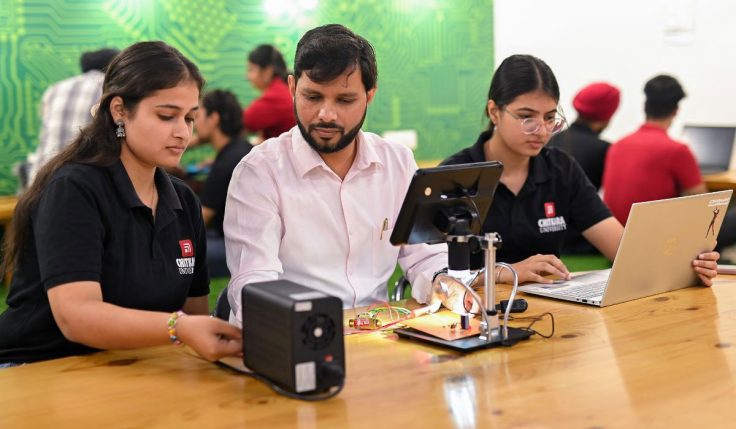B Tech in Civil Engineering is the best option for students who want to work profitably as an engineer in one of the most relevant disciplines of engineering. They prepare, design, and build infrastructure projects like roads and bridges, buildings, and water supply systems. As the demand in the field of sustainable and innovative constructions continues to grow, meeting key skills during a B.Tech in Civil Engineering becomes inevitable to be successful in your career. So, in this blog, we’ll move through the top skills to develop while pursuing a B.Tech in Civil Engineering to set you on the path to a thriving career.
Technical Proficiency
B.Tech Civil Engineering usually provides a full founding technical skills base. Courses include subjects like structural analysis, geotechnical engineering, and fluid mechanics. They are fundamental to the theoretical base of research. Courses also teach software tools such as AutoCAD, Revit, and STAAD Pro. Design and visualization of projects will be there in AutoCAD, Revit, and STAAD Pro, etc. As every technical skill is required for academic excellence, but at the same time, it is sought after by employers in the civil engineering field.
Project Management Skills
Civil engineering projects are multi-dimensional, meaning they all interface simultaneously be it budgeting, scheduling, quality control, and abiding by safety regulations. By developing project management skills throughout the B.Tech civil engineering course, you will be better capable of leading projects efficiently. The knowledge of project management software tools and methodologies, such as the Gantt charts, and critical path analysis, will be extremely useful as you continue to advance in your profession.
Analytical Thinking
Civil engineers need to analyze complexities and determine logically which will further lead towards taking the right decisions. You might face a lot of such challenges while pursuing your B.Tech in civil engineering. From soil condition assessments at a new building site to proposals for designs, improving your analytical ability makes you come up with specific problems and propose solutions with proper justification.
Communication Skills
Effective communication is essential for civil engineers because you would have to work with varied stake holders involving architects, contractors, and local authorities. Becoming fluent in oral as well as written communication through your B.Tech ensures that you would be able to express ideas, project details, and give a detailed account of reports. Attention to detail is key to teamwork and project delivery.
Attention to Detail
Civil engineering projects demand strict attention to issues on safety, compliance, and quality. Close observation, as has been cultivated during education, will allow students to identify problems at an early stage during design, in materials, and construction methods. Such care can go a long way in cost-cutting and enhanced project results, hence offering a value-added attribute for the civil engineer.
Knowledge of Building Codes and Regulations
A civil engineer must be very well aware of building codes, safety regulations, and environmental laws as well so that his projects can pass through legal and regulatory requirements. You will all learn this in your B. Tech in Civil Engineering, but codes change, and new rules come out, so you have to keep an eye on them as well. That knowledge protects public safety and increases your credibility as a professional in the field.
Sustainability Awareness
With increasing awareness toward sustainable development in the construction industry, the understanding of sustainability principles is becoming increasingly relevant. Familiarizing yourself with eco-friendly materials and energy-efficient design practices in addition to adopting the sustainable construction methods during your B.Tech will help you stand out from your contemporaries. This allows you to contribute positively to environmental challenges and manage the requirements of modern engineering projects.
In conclusion pursuing a B.Tech in Civil Engineering offers quite a number of opportunities for career advancement, but mastering essential skills can surely enhance your prospects for success. Technical proficiency, project management, fine communication, and sustainability are some of the skills that shall prepare you for the challenges and responsibilities that the civil engineering profession entitles you to. When you’re planning your educational journey, never forget that the money spent today, while gaining new skills for a B. Tech in civil engineering, shall surely open the floodgates for fulfillment through a dynamic career in civil engineering. So challenge and opportunity, here’s to building a sustainable future!
Chitkara University’s B.E. in Civil Engineering program, specializing in Artificial Intelligence (AI) and Machine Learning (ML), is designed in partnership with L&T EduTech to prepare students for the future of civil engineering. This four-year program integrates traditional civil engineering principles with cutting-edge AI and ML applications, focusing on enhancing areas like quality management, design optimization, and risk control. Students gain hands-on experience with industry-standard tools and languages and participate in extensive industrial training to ensure they are industry-ready.
Also, read this blog post: Building the Future: Exploring the Benefits of a Civil Engineering B.Tech Degree
The collaboration with L&T EduTech bridges the gap between academia and industry, aligning the curriculum with current technological advancements. Graduates are well-equipped for various roles, such as Construction Engineers, Structural Engineers, and Site Engineers, with employment in civil engineering expected to grow significantly. This program offers the opportunity to join India’s top-rated university and be at the forefront of innovation in civil engineering, making it an ideal choice for aspiring engineers eager to lead in a technology-driven world.






